This year the first world cup was unpopular, hit by the proximity of the European Championships only a few weeks later. The result was that Switzerland and Spain swallowed up most of the points on offer in Zagreb in early May, then this weekend Varese played host to the return of several big countries to the fold. By the end of Sunday (18th of June) Switzerland had maintained their lead in the World Cup points ranking — and four separate events — thanks to two quads, a double and a pair who all performed beautifully under the pressure of now having to deal with Australians, Americans, Chinese and British crews as well as many others.
Row360 coverage of 2023 World Rowing Cup Series
Britain topped the medal table, and are now only twenty points behind the Swiss with Lucerne yet to go, but Australia, Germany and the few US crews who made the journey also had a lot to be proud of. Oh, and the lake gods provided perfect conditions twice in the weekend, resulting in a clutch of world best and world cup best times including — finally — a WBT for British para-cox Erin Kennedy.
Australia, who use the other end of Lago di Varese as their northern summer base, had flown out of the chilly Australian winter only a week before. They were over the jetlag but only a short time into an intense training period, and will be much more dangerous in Lucerne. The big rivalries were the usual ones — the sweep boats — particularly a nice little match-up between the Tokyo Olympic champion four and the latest incarnation of an M4- in a British squad which showed last year that it can beat the world.
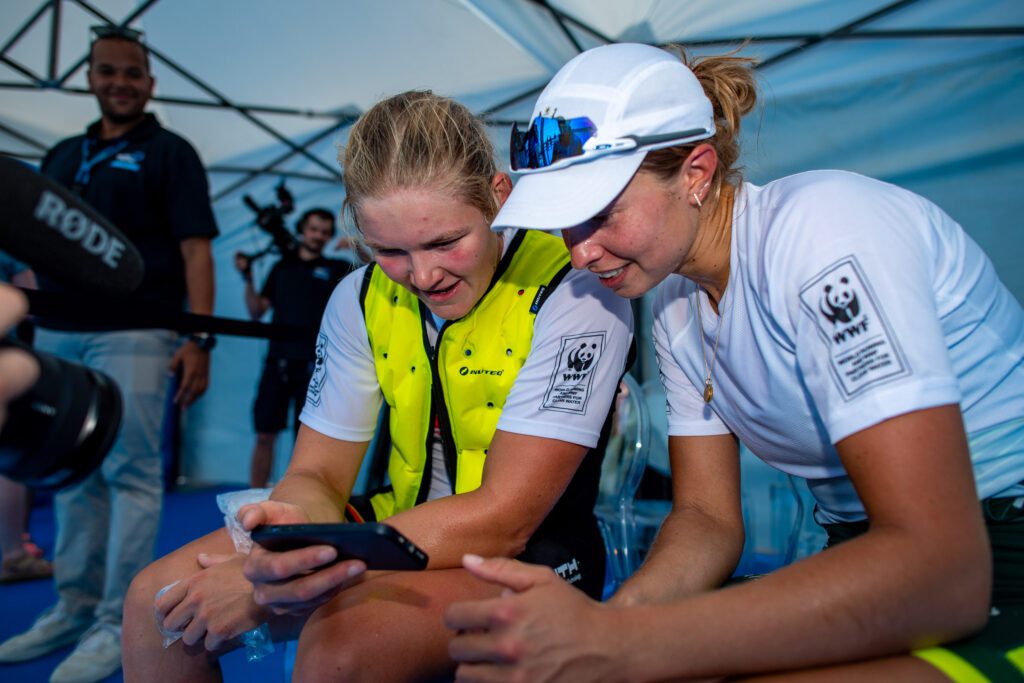
Photo Alexander Foester and Tara Rigney rewatch their race in the women’s single sculls.
Credit Benedict Tufnell
Round one was a win to the Brits in Saturday’s semi-final, then Australia tried to get their revenge in the final, but couldn’t quite do it. After a couple of minutes sitting alongside one another in mid-race, British stroke Freddie Davidson squeezed the pressure on and was able to move out by nearly a length towards the line.
“They’ve strengthened their line-up, returning to the full Tokyo line-up”, said Briton Dave Ambler, “so obviously racing the Olympic champions brings with it a lot of pressure, but it’s something we look forward to taking on. [Being alongside a crew for a long time] is really something we’re trying mentally to prepare for. Christian [Felkel]’s always working with us really well on if that’s the case, looking to row well technically and keep putting crews under pressure.”
“We were keeping an eye on the Chinese who came out hard with us and keeping an eye on the Americans on our bow side too”, said Australia’s Spencer Turrin. “What a good race to get on the final day.” “We were trading blows there [with GBR], it always makes it very exciting”, said Alex Purnell. “We were pretty happy with our race, have plenty to improve and work on.”
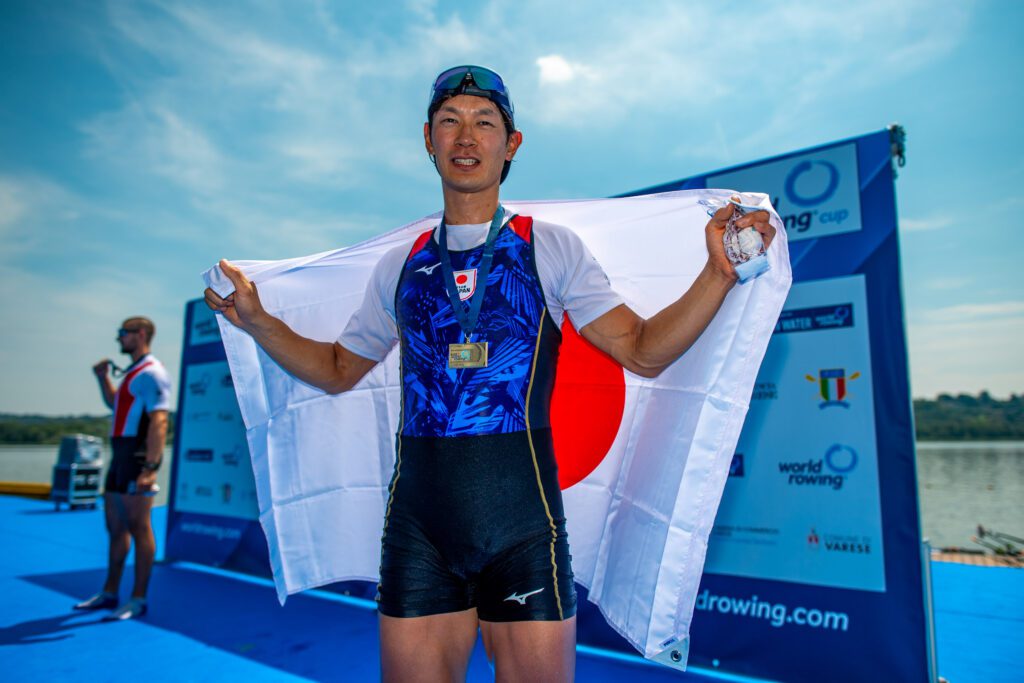
Photo Ryuta Arakawa wins Japan’s first ever men’s single sculls medal.
Credit Benedict Tufnell
In the lightweight men’s doubles the Swiss duo made hay while the terrifyingly good Irish were absent, and took a narrow lead which they had to battle like stink to hold against France and Italy. “All boats can be fast, so we try always to do everything [we can]. I think we did that today, better profile than yesterday”, said Raphael Ahumada Ireland, the Swiss strokeman, phlegmatically accepting that they could have broken a world cup best time had they pushed their finish just 0.9 seconds harder. “We tried all race to stay with the Swiss”, said Italy’s stroke Gabriel Soares. As ever the Italian sculling selections have not yet been made, so the most competitive lightweight squad in the world has no idea who will be racing where come September.
The Swiss also had to deal with the British, whose men’s pair turned the tables on them after some intense thinking about what had gone wrong in Bled. The duos of Roman Röösli/Andri Gulich (SUI) and Ollie Wynne-Griffith/Tom George (GBR) have been nicely matched, but this time the GBR bowball had the upper hand and a new world cup best time, and the Swiss had to settle for silver. The losers in this little enterprise were the new Australian pairing of Angus Dawson and Joseph O’Brien. They clinched the bronze but looked thoughtful in the medal zone, presumably now plotting the downfall of the two other medallists next time round (which will be Lucerne rather than Henley).
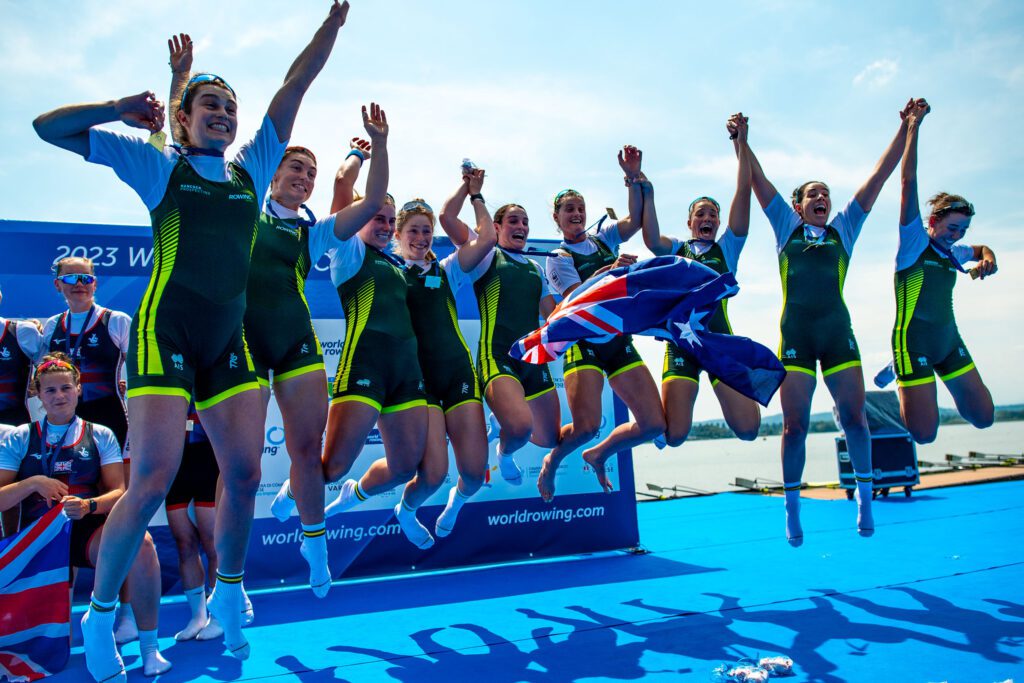
Photo AUS W8+
Credit Benedict Tufnell
“Changed a lot, we feel a lot more comfortable”, said Wynne-Griffith. “Elements of all three races were really strong, we’re starting to feel we’re putting the blocks into place which is a nice feeling.” “In Bled we fixated too much on the people. Jürgen’s [Grobler, his ex-coach] adage is that it’s always more important to win the race than anything else. Coming to the 1km mark we knew our pace was rich and strong, we knew we could carry that on for at least the next 500 then start to wind, so we were never worried about people pushing back.”
The US team got a lot out of racing, but their one significant victory came in the women’s fours, a quartet by no means yet confirmed in selection, but romping to a neat win after a clear water lead over the rest. Best of the following pack were Australia and Britain in an event for which each has shown star quality, but with the Chinese hot on their heels. “We knew we tightening up the race, and we were prepared for that”, said Madeleine Wanamaker (USA). For us it was just remaining calm with what we knew we could do”. “Josy [Verdonkschot, coach] is a really good high performance coach”, added her crewmates.
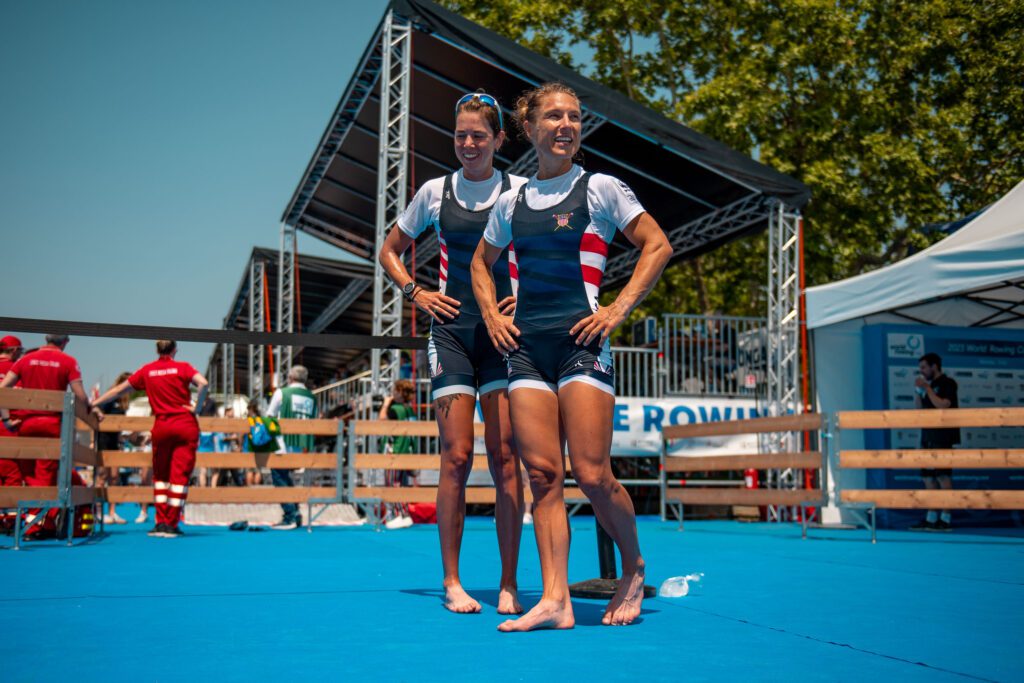
Photo USA LW2x
Credit Benedict Tufnell
The crowning glory for hosts Italy was a gold for Luca Rambaldi and Matteo Sartori, who came bursting through China and the USA to take the men’s doubles title. After the race Rambaldi and Sartori embraced each other and their coach tearfully. It would have been the 29th birthday of their lost comrade and sculling crewmate Filippo Mondelli, who succumbed to osteosarcoma before the pandemic had really ended. Remembering him with a victory was most appropriate.
Whatever is going on in Germany they had a good Italian weekend with young uber-talent Alexandra Foester and the slightly older Oli Zeidler capturing the singles titles, and a men’s eight which got itself onto the podium again shadowing Britain and Australia to the line. The GB men’s eight were out in front for this one, reclaiming their cox Harry Brightmore from illness and setting about victory with solid determination. As a straight final it wasn’t much to shout about, but the Aussies got a sense of their speed out of it, and Germany were very satisfied to be able to take a medal home so (nearly) everyone was happy.
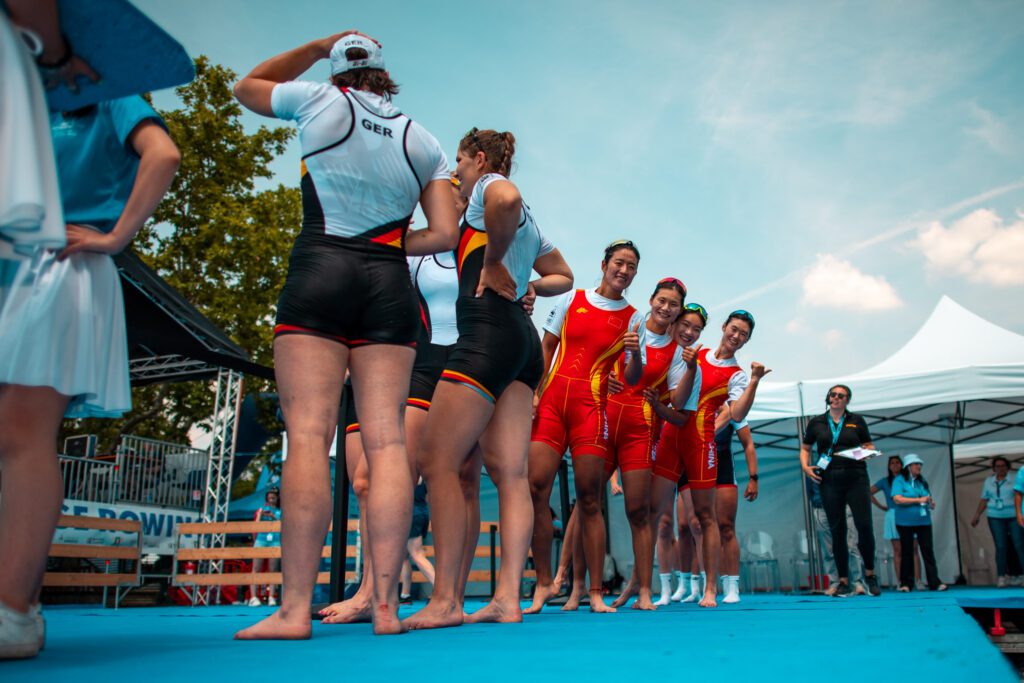
Photo CHN W4x
Credit Benedict Tufnell
That wasn’t the case for Canada’s women’s eight, still trying to rebuild its former glory with the cox and three rowers from the magic 2020 Olympic outfit. Having watched that emotionally-charged Tokyo race and spoken to the crew afterwards about how the memory of a lost heroine had inspired them as thunder and lightening rolled around the Japanese skyscrapers, I’m not sure it would be easy to repeat the feat. In Varese the fact that only three crews had entered meant only two medals, and with Australia a confident length up all the way, Canada found themselves without a reward for travelling so far when their last-ditch attempt to overhaul Britain for the silver failed by 0.09 seconds in the last dash to the line.
China had their success in the women’s quads, an event always dear to their hearts. This Chinese quartet led all the way, Britain in silver with enough of a margin not to be troubled by Germany in a combination which though new is starting to make a mark, and has a lot of potential. The men’s quads was a glorious win for Poland ahead of a violent tussle between Italy and Britain, which Italy won by reclaiming the silver-medal place just as Britain were starting to think it might be theirs.
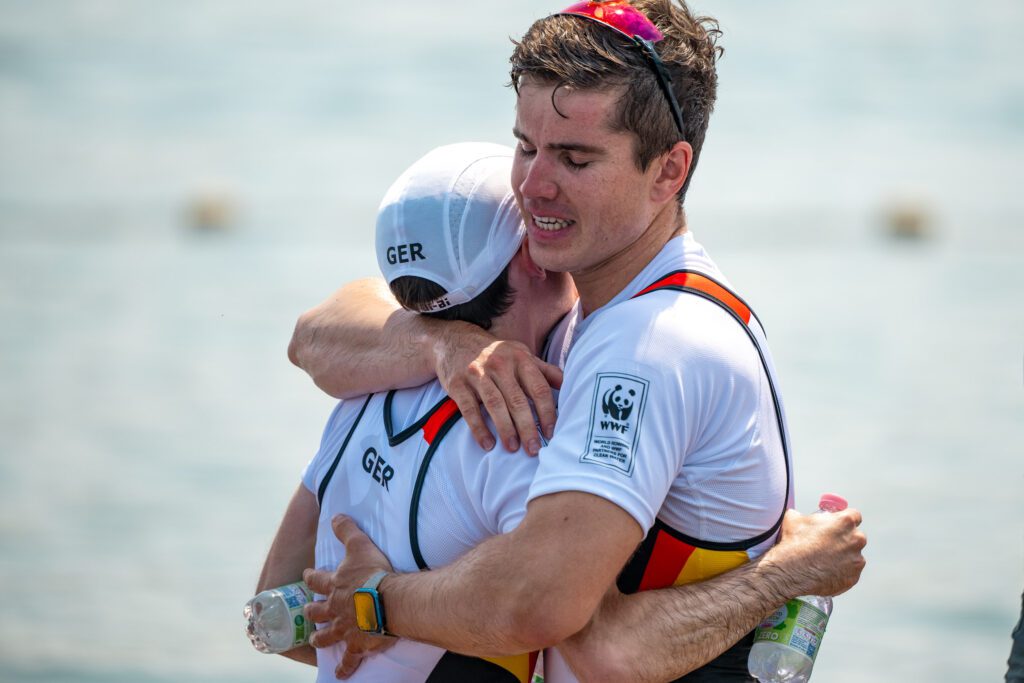
Photo GER M8+
Credit Benedict Tufnell
Emily Craig and Imogen Grant have been busy for a while dismantling the reputations of the Italian and French doubles who beat them in Tokyo, and on Saturday claimed a new LW2x world best time with Grant’s own LW1x record which she captured at Lucerne in 2022. It was a corking race, the French then Americans taking on the lead before the power of the GB finish told enough to lead five strokes before the end. 0.08 seconds the Sunday margin over the USA, and a quality race from three doubles who know exactly how to read their crewmates.
Row360 coverage of 2023 World Rowing Cup II
“I was able to just turn off my brain, turn off my mouth and feel what Molly was doing”, said Michelle Sechser, moving to the bow seat for the first time in this experienced combination. “A little more drive through the hips and I knew she was ready to go.” “[For us] it’s witchcraft”, claimed Grant. “We do our best rowing when we’re not thinking about it, no thoughts, just vibes”. “I suspect from Bled everybody in the world went away thinking ‘do the British have a finish, because they’ve not had to use it’”, added Craig. “We also went away thinking that. So we knew we bloody well had to make sure we had a finish”.
The para-crews provided some of the best racing of the weekend, multiple champion Birgit Skarstein (NOR PR1 W1x) was nearly overhauled by Moran Samuel (ISR). “[Birgit] has spent a long time being alone out there, so I promised her that every year I will try to push her more”, said Moran, who spends several weeks every summer training at Varese’s other end and claims her children are half-Italian.
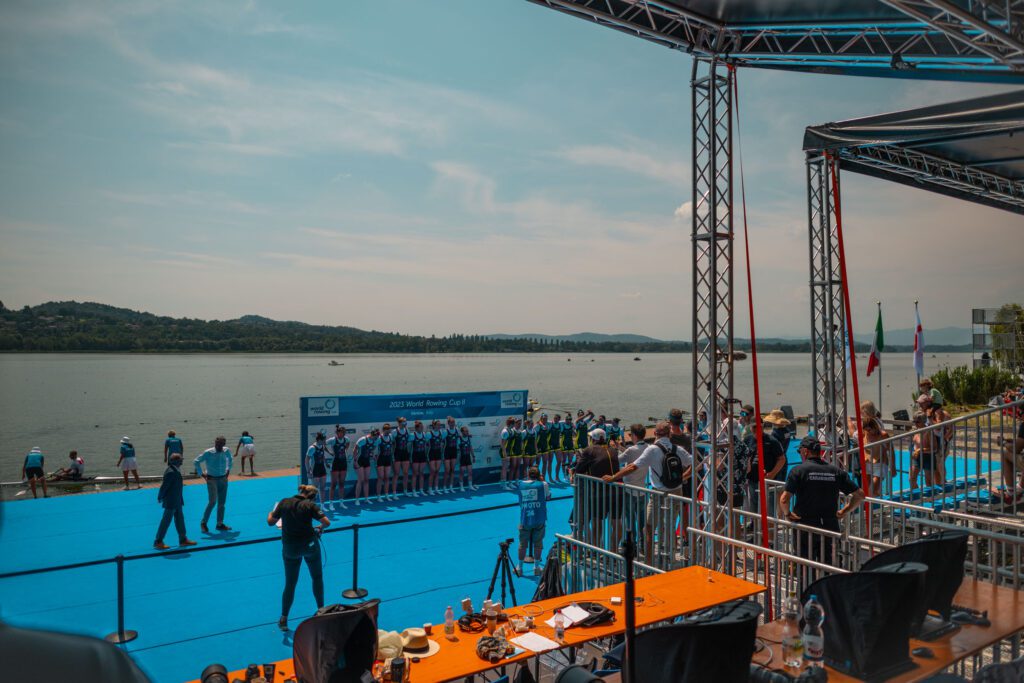
Photo Podium at 2023 World Rowing Cup II in Varese, Italy.
Credit Benedict Tufnell
In the next race, the PR1 men’s singles, there was a storming final during which world champion Roman Polianskyi (UKR) ripped into European champion Giacomo Perini. Generally Perini has had the upper hand in their rivalry, though Polianskyi has a good record at the non-World Rowing Gavirate Regatta which is held at the other end of the two-course Lago di Varese. The major upset was at the 2022 worlds, where the Ukrainian outsmarted his rival. This year the turnover has happened earlier, Perini saying he just felt heavy, and scowling like a thundercloud as he came ashore to pick up his silver.
“The weeds in the water were catching and stopping me”, said Polianskyi, but he was clearly pleased and dedicated his win to his wife. “I hope I will be able to compete in Paris”, he explained while discussing the future. “Due to Russia and the Russian aggression, we (Ukraine) can’t go to competitions with Russians.” Not even if they are competing as Independent Neutral Athletes, apparently. “It doesn’t matter. For us it’s a Russian person and the Russians make war on this country.”
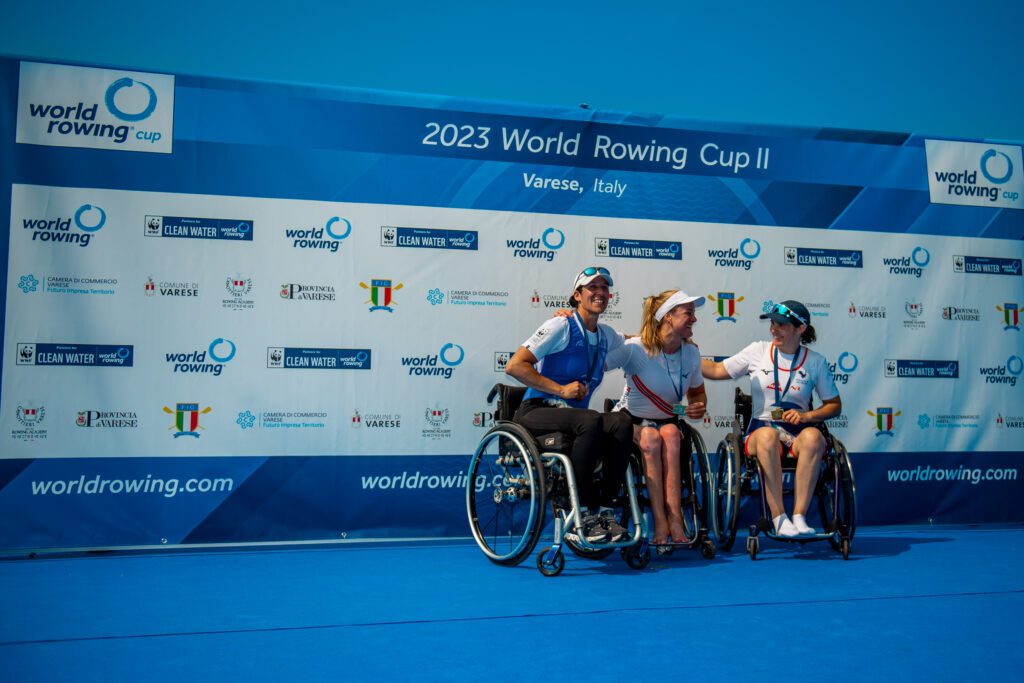
Photo PR1 W1x
Credit Benedict Tufnell
It’s delicious to see the para-singles getting as feisty and competitive as their Olympic counterparts. Having had double Dutch wins last year and in Bled last month, this time it was Germany’s turn to supply both singles champions in races which had the crowd cheering. First the still-very-youthful Alexandra Foester pulled off an exhilarating coup beating both Australian talent Tara Rigby and also the wily Kara Kohler (USA) in the same race, timing her move very precisely to jump race leader Rigney in the last few hundred metres and expertly fend off Kohler’s attempts to disrupt both of them.
“It’s always so fun racing Alex because she makes the race so entertaining”, said Rigney. “I’ve had to fix my start a bit going into this so I was happy with that”. “I just go and hope, I didn’t look at the tower at all, I only saw Kara next to me, and it worked”, said Foester. Kohler said, “That was like an eight [out of ten], I felt like I stepped up a bit in the second half. Baseline goal was to come in top four for our internal qualification: I could accept the nomination for the single if I’d like. Yes I’ll take that, it’s been the goal for this season.”
Row360 coverage of 2023 World Rowing Cup II
A thought or two about the bigger teams suggests that the German squad outside their prioritised men’s eight is starting to find its feet but slowly, whilst the Australians will have been spurred on by their results here — great in patches, good but not quite close enough in others — to train even harder. Because they stayed at home and haven’t yet finished selection, New Zealand will be an unknown quantity until Lucerne, and the American and Canadian gambits won’t be completely clear until their worlds team is named, but they are building quick crews in some areas. The impact of Jürgen Grobler’s training programme on France is apparently variable, but everyone is tightening the noose around the necks of those who thought they had victory sewn up this year. It’s the year to push for every little inch, every single day. Roll on Lucerne.
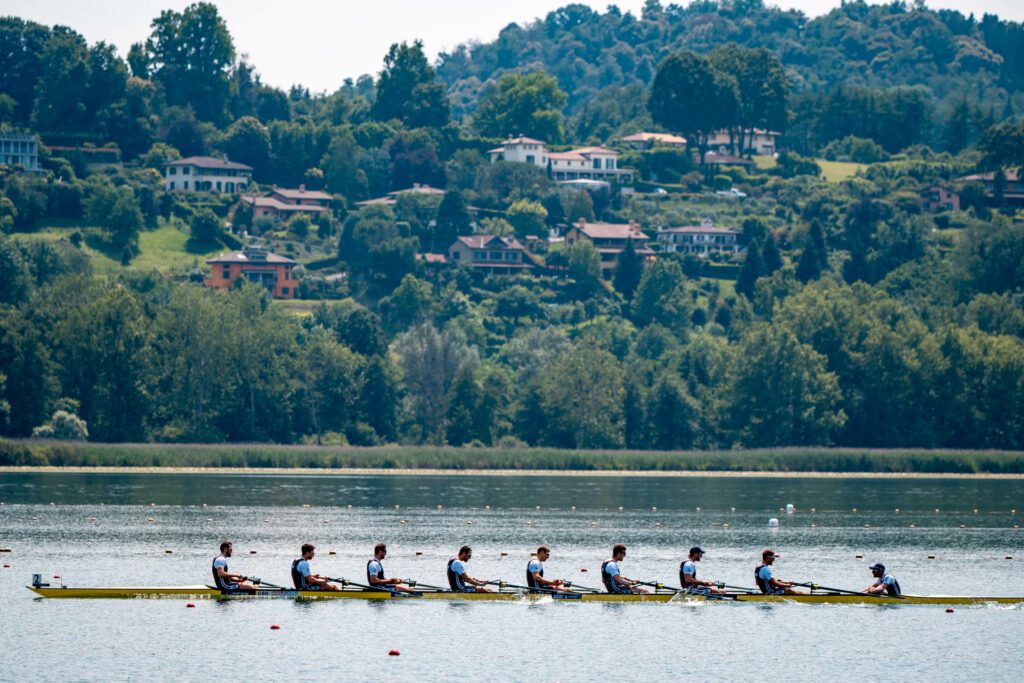
Photo GBR M8+
Credit Benedict Tufnell
